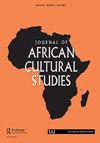音感:解读津巴布韦流散文学作品中的音景
IF 0.7
2区 社会学
Q2 CULTURAL STUDIES
引用次数: 0
摘要
在学术界和媒体上,对南非津巴布韦移民的报道往往集中在这些移民所经历的壮观暴力事件上。南部非洲的文学批评也常常以视觉、视觉和奇观为特权。在这篇文章中,我将专注于一个不同的感官维度:声音的文学表现。我展示了声音和音景如何在选定的文学作品中表现出来,可以照亮迁徙经历的日常方面。我关注的是听觉,认为倾听为阅读和解释有关南非津巴布韦黑人移民生活经历的移民小说提供了一种新的方法。在音景理论的基础上,我研究了移民倾听实践的文学表现如何被用来评论生活经历,以及移民文学人物与其他移民的遭遇如何阐明了被迫移民的分层维度。我认为,对文学作品进行以声音为中心的分析,而不是专注于视觉奇观和描述的表现,可以让读者了解移民所经历的无根感。这种听觉方法表明,文学和创造性作品是有用的档案,记录了以祖先和地理为前提的被颠覆和被否认的归属主张。摘要:在isindebeleindela abantu abamnyama belizwe leZimbabwe abatshengiswa ngayo ezincwadini zemfundo lasezindabeni南非,zitshengisa icele elilodwa elikkuluma ngokuhlukunyezwa lokubulawa okungajwayelekanga okuqondiswe kubo njenge zizalwane zokuza。Imibhalo来自南非,ithanda ukuqakathekisa okubonakalayo lokumangalisayo。Kulo umbhalo nkikikukuthi ngigxile kokuhlukileyo emibhalweni njenga mazwi lemisindo。在津巴布韦,人们对自己的祖国充满了信心,他们对自己的祖国充满了信心。Ngigxila kakhulu ekusebenziseni ukuzwa。Impikiso yami ithi ukulalela kungeyinye indlela engasetshenziswa ekufundeni lokutolika imibhalo ngabantu abamnyama津巴布韦abangabahlali bokuza南非。Ngisebenzisa imibono eyaziwayo ngemisindo, ngihlolisisa ukuthi imibhalo ngabantu bokuza isjani izindlela zokulalela zabantu bokuza。Ngiyahlolisisa njalo ukuthi ezincwadini ukufanekiswa kwempilo zabantu bokuza uma behlangana labanye babo, kuyabonisa yini ubuhlungu bokuthuthela南非bengazikhetheanga ukusuka e津巴布韦lapho abazalwa khona。unbono wami uma ngokuthi ukukukukukukukukukukukukukukukukukukukukukukukukukukukukukukukukabantu bokuza bakuzwa njani ukuswelakala kwempande yemvelaphi yabo。Lokhu kutshengisa ukuthi imisisebenzi yemibhalo leminye enje ngokubumba, ukudweba, elandisa imbali zabantu zindlela eziqakakathekileyo zokuwondla izinto ezifihlakeleyo lezingavumelekanga ezivalela abantu ngenxa yenzalo lemvelaphi yabo。关键词:津巴布韦文学;海外移民;声音景观;居民身份;民族;种族;amabala aqakathkileyo; imibhalo yasezimbabwe;本文章由计算机程序翻译,如有差异,请以英文原文为准。
Sonic Sensibility: Reading the Soundscape in Zimbabwean Diasporic Literary Works
ABSTRACTRepresentations of Zimbabwean migrants to South Africa, in scholarship as well as the media, have tended to focus on the often spectacular violence experienced by these migrants. Southern African literary criticism, too, has often privileged the visual, the ocular, and the spectacle. In this article, I focus on a different sensory dimension: the literary representation of sound. I show how sound and soundscapes, as represented in selected literary works, can illuminate everyday aspects of migratory experiences. I focus on aurality, arguing that listening provides a new methodology for reading and interpreting migrant fiction about the lived experiences of Black Zimbabwean migrants in South Africa. Building on theories of the soundscape, I examine how literary representations of migrant listening practices are deployed to comment on lived experiences, and how migrant literary characters’ encounters with other migrants illuminate the layered dimensions of forced migration. I argue that a sound-focused analysis of literary works, rather than a focus on the representation of visual spectacle and description, can give readers access to the sense of rootlessness experienced by migrants. Such an aural approach demonstrates that literary and creative works are useful archives of subverted and denied claims of belonging premised on ancestry and geography.Abstract in isiNdebeleIndlela abantu abamnyama belizwe leZimbabwe abatshengiswa ngayo ezincwadini zemfundo lasezindabeni eSouth Africa, zitshengisa icele elilodwa elikhuluma ngokuhlukunyezwa lokubulawa okungajwayelekanga okuqondiswe kubo njenge zizalwane zokuza. Imibhalo yase Southern Africa ithanda ukuqakathekisa okubonakalayo lokumangalisayo. Kulo umbhalo ngikhethe ukuthi ngigxile kokuhlukileyo emibhalweni njenga mazwi lemisindo. Ngitshengisa ukuthi imisindo lakho konke okuhambisana lemisindo ngendlela okubekwa ngayo emibhalweni yezifundo kungancenda ukukhanyisa ukubana izizwalane zaseZimbabwe zihlezi njani ngemihla njengabantu bokuza. Ngigxila kakhulu ekusebenziseni ukuzwa. Impikiso yami ithi ukulalela kungeyinye indlela engasetshenziswa ekufundeni lokutolika imibhalo ngabantu abamnyama beZimbabwe abangabahlali bokuza eSouth Africa. Ngisebenzisa imibono eyaziwayo ngemisindo, ngihlolisisa ukuthi imibhalo ngabantu bokuza isebenzisa njani izindlela zokulalela zabantu bokuza. Ngiyahlolisisa njalo ukuthi ezincwadini ukufanekiswa kwempilo zabantu bokuza uma behlangana labanye babo, kuyabonisa yini ubuhlungu bokuthuthela eSouth Africa bengazikhethelanga ukusuka eZimbabwe lapho abazalwa khona. Umbono wami uma ngokuthi ukucubungulula imibhalo sisebenzisa imisindo kungcono kulokugxila ngokusebenzisa izibonakaliso lemimangaliso ngoba kuvumela abafundi ukuthi babe lombono ongcono ngokuzwisisa ukuthi abantu bokuza bakuzwa njani ukuswelakala kwempande yemvelaphi yabo. Lokhu kutshengisa ukuthi imisebenzi yemibhalo leminye enje ngokubumba, ukudweba, elandisa imbali zabantu zindlela eziqakathekileyo zokuwondla izinto ezifihlakeleyo lezingavumelekanga ezivalela abantu ngenxa yenzalo lemvelaphi yabo.KEYWORDS: Zimbabwean literaturediasporamigrationsoundscapesidentityethnicityraceAmabala aqakathekileyo: imibhalo yaseZimbabweinhlalo emazweniokuhambisana lemisindo Disclosure statementNo potential conflict of interest was reported by the author(s).
求助全文
通过发布文献求助,成功后即可免费获取论文全文。
去求助
来源期刊

Journal of African Cultural Studies
Multiple-
CiteScore
1.70
自引率
10.00%
发文量
13
期刊介绍:
The Journal of African Cultural Studies publishes leading scholarship on African culture from inside and outside Africa, with a special commitment to Africa-based authors and to African languages. Our editorial policy encourages an interdisciplinary approach, involving humanities, including environmental humanities. The journal focuses on dimensions of African culture, performance arts, visual arts, music, cinema, the role of the media, the relationship between culture and power, as well as issues within such fields as popular culture in Africa, sociolinguistic topics of cultural interest, and culture and gender. We welcome in particular articles that show evidence of understanding life on the ground, and that demonstrate local knowledge and linguistic competence. We do not publish articles that offer mostly textual analyses of cultural products like novels and films, nor articles that are mostly historical or those based primarily on secondary (such as digital and library) sources. The journal has evolved from the journal African Languages and Cultures, founded in 1988 in the Department of the Languages and Cultures of Africa at the School of Oriental and African Studies, London. From 2019, it is published in association with the International African Institute, London. Journal of African Cultural Studies publishes original research articles. The journal also publishes an occasional Contemporary Conversations section, in which authors respond to current issues. The section has included reviews, interviews and invited response or position papers. We welcome proposals for future Contemporary Conversations themes.
 求助内容:
求助内容: 应助结果提醒方式:
应助结果提醒方式:


